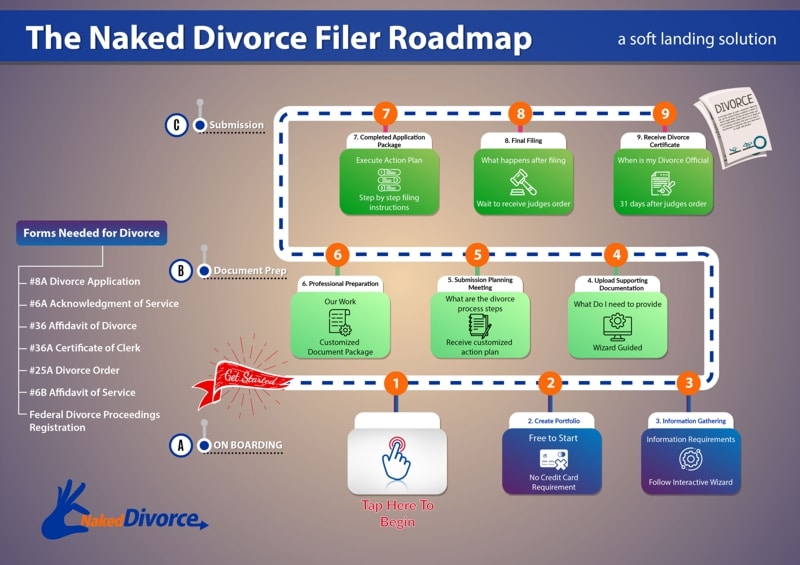Starting a divorce can feel overwhelming, especially when you’re navigating the process for the first time. If you’re wondering how to start a divorce in Ontario, you’re not alone—thousands of couples face this challenging transition every year. The good news? With proper guidance and understanding of the process, you can start a divorce in Ontario without unnecessary stress or confusion.
Studies show that over 70% of couples navigating the Canadian divorce process in Ontario can settle their differences without ever stepping foot in court. Whether you’re dealing with an uncooperative spouse or simply feeling anxious about the complexities of divorce laws in Canada, this comprehensive guide will walk you through everything you need to know about how to start a divorce in Ontario, step by step.
By the end of this guide, you’ll have a clear roadmap for beginning your divorce journey in Ontario, complete with actionable strategies to minimize stress, avoid costly mistakes, and move forward with confidence toward your fresh start.
Understanding Divorce in Ontario: Essential Basics for First-Time Filers
What Does it Mean to Start a Divorce in Ontario?
When you start a divorce in Ontario, you’re beginning the legal process to formally end your marriage. In Ontario, divorce legally terminates your marriage and addresses important matters like property division, child custody, and spousal support. Understanding these fundamentals is crucial before you take your first steps.
Legal Requirements to Start a Divorce in Ontario
Before you can start a divorce in Ontario, you must meet specific legal requirements. Ontario law requires that you prove your marriage has broken down irretrievably. This can be established through one of three grounds:
1. Separation for One Year – The most common and straightforward approach. You and your spouse must live “separate and apart” for at least one year. Importantly, you can still live under the same roof due to financial constraints or children, as long as you’re no longer functioning as a married couple.
2. Adultery – If your spouse has committed adultery, you can file immediately without waiting for the one-year separation period.
3. Cruelty or Abuse – Physical or mental cruelty that makes continued cohabitation intolerable can also serve as grounds for immediate divorce.
For first-time filers, the one-year separation route is typically the most practical and least emotionally taxing option when learning how to start a divorce in Ontario.
Contested vs. Uncontested Divorce: Choosing Your Path
Understanding the difference between contested and uncontested divorce is essential when you start a divorce in Ontario:
Uncontested Divorce occurs when both spouses agree on all major issues including child custody, property division, and spousal support. This path offers several advantages:
- Faster processing time
- Lower costs
- Reduced emotional stress
- Privacy (no court appearances required)
- Complete control over the outcome
Contested Divorce happens when spouses cannot agree on one or more major issues, requiring court intervention to resolve disputes. While sometimes necessary, contested divorces typically involve higher costs, longer timelines, and increased emotional strain.
For first-time filers looking to start a divorce in Ontario with minimal stress, pursuing an uncontested divorce is often the ideal choice.
Step-by-Step Guide: How to Start a Divorce in Ontario
Step 1: Confirm Your Readiness and Eligibility
Before taking any legal action to start a divorce in Ontario, ensure you’re emotionally and practically prepared for this significant life change. Consider these key factors:
Emotional Readiness: Divorce represents a major life transition. Take time to reflect on your decision and consider whether you’re truly ready to move forward. If you have doubts, consider couples counseling as an alternative.
Financial Preparation: Gather information about your household income, assets, debts, and expenses. Understanding your financial situation will be crucial throughout the divorce process.
Living Arrangements: If you haven’t already separated, consider your living arrangements. Remember, you can live in the same house while legally separated, but you must function as separate individuals rather than as a married couple.
Step 2: Ensure You Meet the Separation Requirement
To start a divorce in Ontario, you typically need to meet the one-year separation requirement unless adultery or cruelty is involved. Here’s what you need to know:
Document Your Separation Date: Keep records of when you and your spouse decided to live separate and apart. This date will be important for your divorce application.
Understand “Living Separate and Apart”: You don’t necessarily need to live in different homes. Couples can be legally separated while sharing the same residence for practical reasons like financial constraints or child care needs.
Maintain Separation: During the separation period, avoid resuming marital relations or functioning as a married couple, as this could reset your separation timeline.
Step 3: Gather Required Documentation
When you start a divorce in Ontario, you’ll need several important documents. Collecting these early will streamline your process:
Essential Documents Include:
- Original marriage certificate or certified copy
- Birth certificates for any children
- Financial statements including income, assets, and debts
- Property ownership documents
- Insurance policies
- Pension plan information
- Bank statements and investment records
- Any existing separation agreements
Financial Statement Preparation: Ontario requires detailed financial disclosure. Begin organizing your financial information early, including employment income, self-employment earnings, investment income, and all assets and liabilities.
Step 4: Complete the Required Legal Forms
Ontario has specific forms required to start a divorce in Ontario. The primary forms include:
Form 8A – Application (Divorce): This is the main application form that initiates your divorce proceedings. You’ll need to provide detailed information about your marriage, separation, and the relief you’re seeking.
Financial Statement: Depending on your situation, you may need to complete Form 13 (Financial Statement – Support Claims) or Form 13.1 (Financial Statement – Property and Support Claims).
Additional Forms: Depending on your circumstances, you may need additional forms for child support, spousal support, or property division.
Completing Forms Accurately: Take time to complete all forms thoroughly and accurately. Errors or omissions can delay your divorce process significantly.
Step 5: File Your Application with the Court
Once you’ve completed all necessary paperwork to start a divorce in Ontario, you’ll need to file your application with the appropriate court:
Choose the Correct Court: File your application with the Superior Court of Justice in the jurisdiction where either you or your spouse ordinarily resides.
Filing Options: You can file your divorce application in person at the courthouse or online through the Ontario government’s online portal, which offers greater convenience and accessibility.
Pay Filing Fees: The current filing fee for a divorce application in Ontario is approximately $632. Fee assistance may be available for those who qualify based on income.
Obtain Court File Number: After filing, you’ll receive a court file number that you’ll need for all future correspondence and documents related to your divorce.
Step 6: Serve Your Spouse with Divorce Papers
After filing your application to start a divorce in Ontario, you must officially “serve” your spouse with the divorce papers:
Service Requirements: Your spouse must be served with a copy of your divorce application and all supporting documents. This ensures they’re aware of the proceedings and have an opportunity to respond.
Service Methods: Papers can be served through:
- Personal service by a process server
- Registered mail with return receipt
- Acceptance of service (if your spouse agrees to accept the papers voluntarily)
Response Timeline: If your spouse lives in Canada, they have 30 days to respond to your divorce application. If they live outside Canada, they typically have 60 days.
Default Divorce: If your spouse doesn’t respond within the required timeframe, you may be able to proceed with a default divorce.
Step 7: Navigate the Waiting Period and Response
After serving your spouse and while waiting for their response, several scenarios may unfold:
Spouse Agrees (Uncontested): If your spouse agrees with your divorce application and the proposed terms, they can file a consent or simply not respond, allowing you to proceed with an uncontested divorce.
Spouse Disagrees (Contested): If your spouse files a response disagreeing with your terms, you’ll need to negotiate or seek mediation to resolve differences.
No Response: If your spouse doesn’t respond within the required timeframe, you can apply for a default divorce judgment.
Step 8: Resolve Outstanding Issues
Even in uncontested divorces, you may need to address specific issues when you start a divorce in Ontario:
Child Custody and Access: If you have children, you’ll need to establish custody arrangements and access schedules that serve the children’s best interests.
Child Support: Calculate child support using Ontario’s Child Support Guidelines, which consider factors like income and number of children.
Spousal Support: Determine if spousal support is appropriate based on factors like marriage length, income disparity, and future earning capacity.
Property Division: Ontario follows the principle of equalization, meaning the value of property acquired during marriage is typically divided equally between spouses.
Step 9: Obtain Your Divorce Order
The final step to start a divorce in Ontario involves obtaining your official divorce order:
Application for Divorce Order: Once all issues are resolved and waiting periods are met, you can apply for your divorce order.
Court Review: A judge will review your application and supporting documents to ensure all legal requirements are met.
Divorce Certificate: After your divorce is granted, you can obtain a divorce certificate, which serves as official proof that your marriage has been legally terminated.
Effective Date: Your divorce becomes effective 31 days after the divorce order is granted, unless the court specifies otherwise.
Strategies to Minimize Stress When You Start a Divorce in Ontario
Choose Mediation Over Litigation
Mediation offers an excellent alternative for couples who want to start a divorce in Ontario while avoiding the stress and expense of court battles:
Benefits of Mediation:
- Confidential and private process
- More control over outcomes
- Reduced emotional stress
- Cost-effective compared to litigation
- Faster resolution times
- Improved post-divorce relationships
When Mediation Works Best: Mediation is most effective when both spouses are willing to communicate and compromise. Even couples who disagree on specifics can often benefit from mediation to reach mutually acceptable solutions.
Consider Collaborative Divorce
Collaborative divorce represents another peaceful approach to start a divorce in Ontario:
Collaborative Process: Both spouses work with specially trained professionals including lawyers, financial advisors, and mental health professionals to reach agreements outside of court.
Team Approach: The collaborative team works together to address all aspects of your divorce, from legal issues to emotional support and financial planning.
Commitment to Settlement: All parties commit to reaching a settlement without going to court, creating an environment focused on problem-solving rather than conflict.
Maintain Focus on Your Future
When you start a divorce in Ontario, it’s easy to get caught up in past grievances. Instead, focus on building your future:
Set Clear Goals: Identify what you want to achieve through your divorce, both legally and personally.
Prioritize Children’s Needs: If you have children, make their well-being your top priority in all decisions.
Seek Support: Don’t hesitate to seek emotional support from friends, family, or professional counselors during this challenging time.
Understanding Costs When You Start a Divorce in Ontario
Court Filing Fees and Associated Costs
When you start a divorce in Ontario, understanding the financial implications helps you budget appropriately:
Basic Filing Fees: The standard court filing fee is approximately $632 for a divorce application.
Additional Court Costs: Depending on your situation, you may incur additional fees for motions, case conferences, or other court appearances.
Service Costs: Professional process servers typically charge $75-150 to serve divorce papers.
Professional Service Costs
Legal Representation: While not required, many people choose to hire lawyers. Uncontested divorces with legal assistance typically cost $1,500-3,500, while contested divorces can cost $15,000 or more.
Mediation Services: Professional mediation typically costs $150-300 per hour, with most divorces requiring 4-8 hours of mediation.
Financial Advisors: Certified Divorce Financial Analysts can help with complex property division and typically charge $150-250 per hour.
Cost-Saving Strategies
Uncontested Divorce: Choosing an uncontested approach when you start a divorce in Ontario can save thousands of dollars in legal fees.
Limited Legal Advice: Instead of full representation, consider hiring a lawyer for specific advice or document review.
Mediation First: Attempt mediation before pursuing litigation to resolve disputes cost-effectively.
Self-Representation: For simple, uncontested divorces, self-representation can significantly reduce costs.
Documentation Checklist: Essential Papers to Start a Divorce in Ontario
Marriage and Personal Documents
When you start a divorce in Ontario, gather these essential personal documents:
- Original marriage certificate or certified copy from the province where you were married
- Birth certificates for you, your spouse, and any children
- Citizenship or immigration documents if applicable
- Social Insurance Numbers for all family members
Financial Documentation
Comprehensive financial disclosure is required when you start a divorce in Ontario:
Income Documentation:
- Recent pay stubs and T4 slips
- Tax returns for the past three years
- Employment contracts or offer letters
- Self-employment income records
- Investment income statements
- Pension or retirement plan information
Asset Documentation:
- Property deeds and mortgage statements
- Bank account statements
- Investment account statements
- Vehicle ownership documents
- Insurance policies (life, disability, property)
- Business ownership documents
- Valuable personal property appraisals
Debt Documentation:
- Credit card statements
- Loan agreements and statements
- Line of credit information
- Any other outstanding debts
Child-Related Documents
If you have children, additional documentation is necessary:
- School records and enrollment information
- Medical and dental records
- Childcare and activity expenses
- Any existing custody or access agreements
- Child support payment records
Avoiding Common Mistakes When You Start a Divorce in Ontario
Documentation Errors
Incomplete Financial Disclosure: Failing to provide complete and accurate financial information can delay your divorce and damage your credibility with the court.
Missing Deadlines: Pay attention to all court deadlines and response times to avoid complications.
Incorrect Forms: Using outdated forms or completing forms incorrectly can result in rejection and delays.
Emotional Decision-Making
Acting in Anger: Making decisions based on emotion rather than logic can lead to poor outcomes and increased conflict.
Using Children as Messengers: Never involve children in adult conflicts or use them to communicate with your spouse.
Social Media Mistakes: Avoid posting about your divorce proceedings or making disparaging comments about your spouse online.
Legal Missteps
Assuming Verbal Agreements are Binding: Always document agreements in writing and have them properly executed.
Hiding Assets: Attempting to hide assets is not only unethical but can result in serious legal consequences.
Ignoring Tax Implications: Consider the tax consequences of property division and support arrangements.
Moving Forward: Life After You Start a Divorce in Ontario
Updating Legal Documents
After you start a divorce in Ontario and receive your divorce order, several important tasks require attention:
Estate Planning: Update your will, power of attorney, and beneficiary designations on insurance policies and retirement accounts.
Government Records: Notify relevant government agencies of your status change, including the Canada Revenue Agency, Service Canada, and provincial health insurance.
Financial Institutions: Update banking arrangements, investment accounts, and credit facilities to reflect your new circumstances.
Building Your New Life
Financial Independence: Develop a budget and financial plan for your post-divorce life, including updating insurance coverage and retirement planning.
Co-Parenting Relationships: If you have children, focus on building a positive co-parenting relationship that prioritizes their well-being.
Support Networks: Maintain and develop support networks including friends, family, and professional support services.
Personal Growth: Consider this transition an opportunity for personal growth and pursuing goals that may have been postponed during your marriage.
Conclusion: Your Path Forward
Learning how to start a divorce in Ontario doesn’t have to be an overwhelming experience. With proper preparation, understanding of the process, and focus on your future goals, you can navigate this transition successfully. Remember that while divorce represents the end of your marriage, it also marks the beginning of a new chapter in your life.
The key to successfully managing your divorce lies in staying informed, making thoughtful decisions, and seeking appropriate support when needed. Whether you choose mediation, collaborative divorce, or traditional litigation, the most important factor is finding an approach that works for your unique circumstances.
By following this comprehensive guide on how to start a divorce in Ontario, you’re taking the first step toward resolving your marriage legally and building a foundation for your future. While the process may seem daunting initially, thousands of people successfully navigate divorce in Ontario every year, and with the right approach and support, you can too.
Take time to process this information, gather your required documents, and consider your options carefully. Your future self will thank you for taking a thoughtful, informed approach to this important life transition.


















































